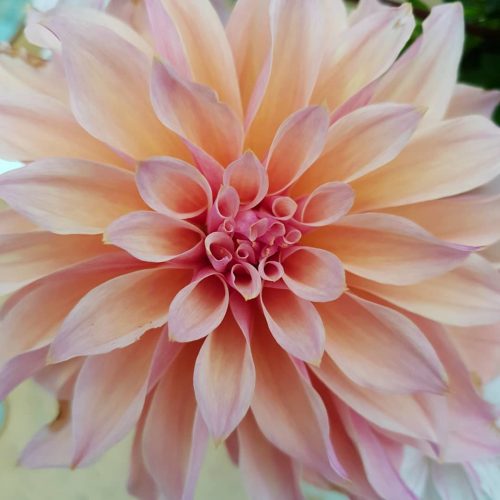Get your garden ready for Spring and Summer 2020
Monday, March 02 , 2020

Britain has faced a battering from the recent storms. Some households have suffered badly from the flooding. It has felt at times that this winter is never ending. However bad winter is, spring always arrives – eventually. With it comes hope for better times. Although your garden might be a bog or worse at the moment we can plant seeds now and enjoy the marvel of watching them grow with the promise of the blooms to come. Let’s look at some gardening trends for 2020 and get ready for more clement weather.
Going wild
Formal gardens with hard borders are out of fashion this year. Softer edges with wildflowers are in. The idea is to foster a relaxed approach to trimming your plants, let them go a little wild to encourage wildlife into gardens in both urban and rural settings. Councils are following this trend, letting verges grow wild to increase bee and butterfly populations.
Grow sunflowers, Alliums and Agapanthus where the seed heads are left to ripen to feed birds and other garden life. Consider your planting schemes to for a sustainable garden habitat and attract pollinators. Geums attract butterflies, Lavender is loved by bees, Marigolds encourage ladybirds, Magnolias are pollinated by beetles and apparently Honeysuckle attracts bats! Even our stand at this year’s RHS Chelsea Flower Show has been designed to encourage a garden wildlife.

Photo by David Bartholomew. Chilstone 2019 RHS Chelsea Flower Show Stand featured Lavender and Alliums.
Softer edges also add an element of romance to your garden, so what are you waiting for? Add big blooms that tumble from planters and blur the lines between your boarders.

Chilstone’s Harewood Jardiniere in a garden designed by Kate Ball.
Home within your home
Another trend is to make your garden a home for wildlife. A log pile, pond and compost heap will make your garden more inviting for many creatures. Don’t stress about a little mess. Make a leaf pile or a compost heap from garden debris in a quiet corner to encourage worms, and hedgehogs. Make a bee hotel out of bamboo plant supports to encourage pollinators.

Not all bees live in hives. Encourage solitary bees by making a home for them.
A water feature can be a garden lifesaver for a wide range of animals and insects. If you don’t have a lot of space add a bird bath. It will be a vital a water source for birds of all kinds, even birds of prey if you are lucky, as well as dragonflies and maybe even a frog! If you do have space and want a statement water feature, why not go all in with a beautiful cast stone fountain? Our whole fountain range can be mixed and matched to create the look you want to fit gardens large and small.

Chilstone’s Banbury fountain makes a beautiful feature but the range includes smaller fountains for compact spaces.
Organic compost
A good compost has always been vital for gardeners. It also encourages worms as well as creating a sustainable growing medium. Use leaf mulch, grass clippings, vegetable peelings and egg shells to create a nutrient rich base for your plants. It is easy to maintain and you don’t need much space to create your own compost heap. You just need an unused corner, tucked away, large enough to house a vessel the size of a kitchen bin. Keep it well watered to allow your clippings to rot down.

Leaves rot down to make a good compost.
You can also add manure, but a number of vegan gardeners are opting for green compost instead, growing plants like Comfrey (Symphytum), to create fertiliser for their vegetable patch. The roots are very deep and access nutrients like nitrogen and bring them to the surface. This avoids disturbing the soil with a lot of digging, but be warned, brewing your own fertiliser from Comfrey leaves creates a strong stench!
You can also use you compost heap to quickly establish a weathered patina on your garden ornaments. This only works on garden ornaments made from a porous material like cast stone.

Weathering a Cast Stone Hare statue in compost quickly creates a patina that highlights the detailed features. Watch this space for a how to guide!
No dig gardening
Another big trend is no dig, which is gardening without disturbing the soil. The idea is that digging damages roots and upsets the microbe balance in the soil. This isn’t a new idea, but it is really catching on. Charles Dowding has been pioneering this ideology for decades. Kill weeds by covering them with sheets of recycled cardboard, to cut the light and make them wither. Use your homemade leaf mulch and compost to add a soft and nutrient-rich base to anchor in new plants. This will save time as well as your back! It’s sustainable gardening that works best in raised beds, which makes it suitable for gardens of every size.

Add your home made compost to your no dig garden beds.
Grow Your Own
Grow your own has been a huge trend for a number of years, featuring in many show gardens at the Chelsea Flower Show. Growing vegetables in planters, creating vertical edible walls, even cramming herbs and berries into petite front gardens is here to stay. Gardeners love to eat the fruits of their labour, expanding veg plots into all sorts of containers to combine function with style. From showy courgette flowers to tumbling tomato plants let your vegetables merge with your flowers to encourage pollination and make the most of your growing space! Youtube is full of advice for rookie veg growers so this trend looks here to stay

Grow your own purple sprouting Broccoli. (Photo by Kate Walker)
Edible flowers
Eating what you grow doesn’t stop with carrots, edible flowers are really popular. Although you can eat pansies and the viola family in salads, you need to be a bit careful. Popular bedding plants are mass produced and can be pumped with chemical pesticides and fertilisers in vast nurseries. Try raising your edible flowers from seed to be sure that they are not harmful. Or eat flowers from your veg garden, like courgettes, although that will reduce your harvest.

It’s not just sunflower seeds that are edible. (Photo by Kate Walker)
Try sunflower petals cooked in pasta, the buds can also be cooked and taste similar to Artichokes. Fennel blossom can be eaten as well as the rest of the plant and Magnolia Grandiflora buds can be pickled, while Magnolia Soulangeana buds are best braised! Nasturtiums are great in salads and Hibiscus flowers have been used in foods and remedies for centuries. Experiment and try new flavours.

Hibiscus flowers have been eaten and used in teas for centuries. (Photo by Kate Walker)
Blue Flowers
This year blue flowers are in vogue. From the homely blue Hydrangea to blue Alluims, Agapanthus and Echinops. Why not combine this trend with the movement to encourage wildlife into your garden as these plants produce ornamental seed heads too!

Blue mop-head Hydrangea is a garden classic and back on trend.
We predict that big, showy Dahlias are going to be popular again, Although blue ones are rare there are so many varieties available to make a big impact in your planting schemes. Plant them from tubers or grow them from seed to make spectacular summer blooms!

Dahlia Labyrinth makes has a statement bloom! (Photo by Kate Walker)
Houseplants
The trend for houseplant is insatiable! From giant Monstera Deliciosa to the trickier Alocasia Zebrina, Millennials to seniors are captivated by the indoor jungles on Instagram and strive to create their own! Some plants grow truly huge and you need a some serious planters to house them!

A huge Monstera Deliciosa leaf. These giant plants flourish in large urns or planters.
Our urns are planters are not just for outdoors, they look great indoors too. Use pedestals to create height and show off trailing plants from Rhipsalis to Philodendron Lemon Lime. Use our planters as cover pots, just ask for them without drainage holes. Why not paint them to fit your style and show off the foliage markings? Try Maranta Leuconeura or a Ctenanthe Burle-Marxi with a cast stone planter painted in Farrow and Ball Railings, or a Syngonium in an urn painted in Fired Earth Hummingbird.

Maranta Leuconeura have fascinating markings. (Photo by Kate Walker)
Seven decades of gardening
Whatever the garden trend, our skilled team have been hand making our products for seven decades. We have seen our products in displays across the globe, bringing all sorts of garden designs and planting schemes to life. Our team will always offer advice to help you bring out the best in your garden project. We are now open Mon-Sat, pop in and see us! Or visit our stand at the RHS Chelsea Flower Show 2020!

Chilstone’s 5 star stand at the RHS Chelsea Flower Show (Photo by David Bartholomew)

Designed by Brand Skillings Ltd | Website managed by Weekend


